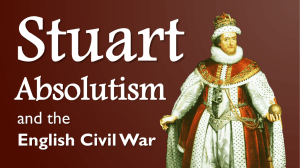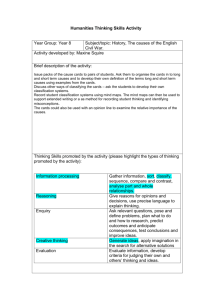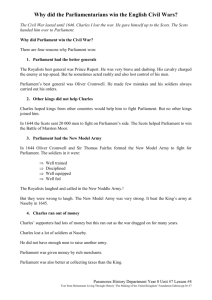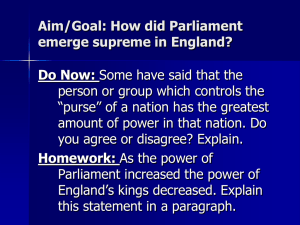Study Guide
advertisement
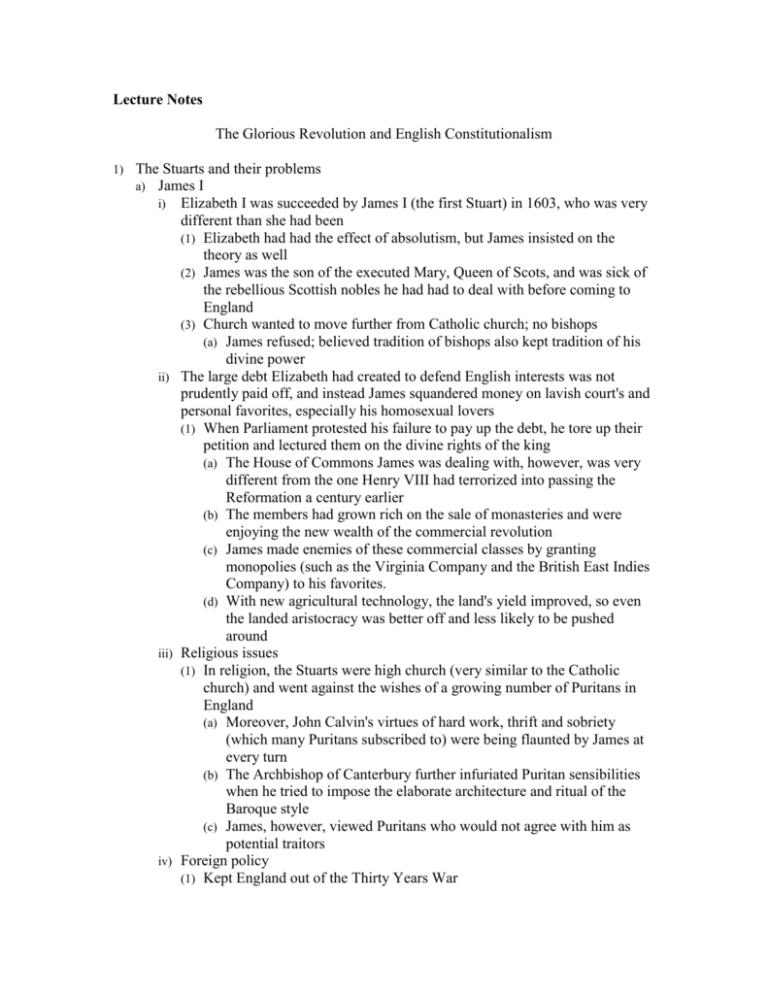
Lecture Notes The Glorious Revolution and English Constitutionalism 1) The Stuarts and their problems a) James I i) Elizabeth I was succeeded by James I (the first Stuart) in 1603, who was very different than she had been (1) Elizabeth had had the effect of absolutism, but James insisted on the theory as well (2) James was the son of the executed Mary, Queen of Scots, and was sick of the rebellious Scottish nobles he had had to deal with before coming to England (3) Church wanted to move further from Catholic church; no bishops (a) James refused; believed tradition of bishops also kept tradition of his divine power ii) The large debt Elizabeth had created to defend English interests was not prudently paid off, and instead James squandered money on lavish court's and personal favorites, especially his homosexual lovers (1) When Parliament protested his failure to pay up the debt, he tore up their petition and lectured them on the divine rights of the king (a) The House of Commons James was dealing with, however, was very different from the one Henry VIII had terrorized into passing the Reformation a century earlier (b) The members had grown rich on the sale of monasteries and were enjoying the new wealth of the commercial revolution (c) James made enemies of these commercial classes by granting monopolies (such as the Virginia Company and the British East Indies Company) to his favorites. (d) With new agricultural technology, the land's yield improved, so even the landed aristocracy was better off and less likely to be pushed around iii) Religious issues (1) In religion, the Stuarts were high church (very similar to the Catholic church) and went against the wishes of a growing number of Puritans in England (a) Moreover, John Calvin's virtues of hard work, thrift and sobriety (which many Puritans subscribed to) were being flaunted by James at every turn (b) The Archbishop of Canterbury further infuriated Puritan sensibilities when he tried to impose the elaborate architecture and ritual of the Baroque style (c) James, however, viewed Puritans who would not agree with him as potential traitors iv) Foreign policy (1) Kept England out of the Thirty Years War Tried to make peace with Spain by marrying his son to a princess (a) Their denial leads to war; James dies as war begins, Charles takes over b) Charles I i) When Charles I (1625-49) came to the throne, he, like all the Stuarts, believed in absolute royal power, but he lacked the two things necessary to carry out his desires (1) One was a royal bureaucracy appointed by him (2) and the other was a standing army to make his will felt ii) As a result he immediately had difficulties with Parliament (1) War with Spain caused Charles to rely on Parliament for money (a) To avoid Parliament began forcing loans from people to pay for war (2) In 1628, the king signed the Petitions of Rights (a) Signed because he needed money for his war (b) Denied the king the right to tax without Parliamentary consent (c) Writs of Habeas Corpus could not imprison without just cause (d) Could not quarter troops in private homes (e) Parliament must be called frequently (not specific) (3) No sooner had Charles signed this, however, than he dismissed Parliament to rule England without calling the Parliament for 11 years, from 1629-40 (a) Had tried to impeach the Duke of Buckingham (rumor was he was sending ships to help France) (b) When the Duke was assassinated, Charles thought the Parliament would cooperate, but they felt that influenced by his wife, Charles was taking England towards Catholicism (c) When Parliament resisted, Charles dismisses them (i) Before they go they pass three anti-Catholic resolutions (d) Charles vows to never convene Parliament again (e) Parliament cannot convene itself, so it uses public opinion against him (4) During this time he raised money by illegal means, such as collecting obsolete feudal laws and fines, forcing loans from his subjects and even forcing the rich to apply for knighthoods and then charging them for the privilege (a) Because of four events, public opinion gradually shifted towards Parliament. The events were: (i) Charles’ treatment of his opponents - for example, John Eliot’s imprisonment in the tower of London until he apologized, which he never did (ii) Archbishop Laud - appointed by the king, the archbishop was a zealous believer in the High Church who was strongly against Puritans (imposed Anglican Prayer Book) (iii) Ship Money Case - to raise money, the king spread a tax that was formerly only applicable to coastal towns to all towns, which Parliament considered a violation of their rights (iv) The imposition of the Anglican Prayer Book which lead to a Scottish rebellion (2) Since putting down the rebellion required $, Charles was forced to call Parliament iii) The Short Parliament (1) Eventually, in the spring of 1640, Charles had to call Parliament back to raise money for war in Scotland against the Scots who objected to having the Anglican Book of Common Prayer foisted on them (2) This parliament was hostile to more taxes for the king and set about to limit his powers and royal authority (3) Upset, Charles dismissed parliament after only 3 weeks (4) It became known as the "Short Parliament" iv) The Long Parliament (1) Before 1640 ended, Charles had to resume parliament to deal with a military disaster in Scotland (2) The Members of Parliament took advantage of the king's dilemma and forced him to agree to a number of concessions (a) Bill of Attainder against Strafford (king’s chief advisor) that demanded Strafford’s death (b) Bill of Attainder against Archbishop Laud (who would die after 4 years imprisonment) (c) Law that gave up king’s right to dissolve Parliament (d) Triennial Act - required having Parliament meet every three years (e) No taxation w/o Parliament’s approval (taxes that had been passed that way declared illegal) (f) The abolishment of the Star Chamber (i) Court of law for nobles (g) Impeachment of Bishops in Anglican Church. (3) this parliament sat for the next 13 years, earning it the name of the "Long Parliament" (a) Was going to impeach the queen, which led 2) English Civil War a) By 1642, the Puritans had gained control of Parliament i) they drafted a document known as the "Grand Remonstrance," which listed numerous grievances against Charles and appealed to the public for support (1) Were going to impeach the queen ii) Charles objected and took to the field in 1642 (1) Went to Parliament to have them arrested, but they were gone iii) Parliament offered the 19 Propositions (which stated Parliament’s superiority), but Charles refused to sign and led to the Civil War b) Civil War i) The two sides (1) The Puritans (known as Roundheads because of their "soup-bowl" haircuts) were led by Oliver Cromwell (2) The loyalists to King Charles I were known as Cavaliers ii) The war raged throughout England for four years iii) Finally, Charles was defeated by Oliver Cromwell's army in 1646 (b) A defeated Charles was accused of treason and executed in 1649--after Parliament had redefined treason to make his previous acts illegal(2) Cromwell purged the Rump Parliament (last of the Long Parliament) of all dissenters which got him firmly in control. 3) The Commonwealth a) The new government was called the Commonwealth i) It proceeded to abolish the monarchy and House of Lords ii) When the Parliament tried to grow rich on the spoils of the defeated cavaliers, Cromwell took over as Lord Protector in 1653, especially when the Parliament tried to disband his army of fifty thousand experienced men he would need to stay in power b) Oliver Cromwell as ruler i) Cromwell became Lord Protector, a sort of military dictator, but not a tyrant dictator in the modern sense (1) After all, he could not veto Parliamentary legislation (2) But the threat of the army was enough to enforce his powers ii) Cromwell experienced many difficulties as Lord Protector (1) As time went on he became intolerant, producing a backlash (2) Stiff-backed Puritan supporters angered the populace by closing the theaters and muzzling the press (3) Foreign adventures inflated the budget to three times that of Charles (4) Cromwell savagely crushed a rebellion in Ireland, leaving a legacy of hatred there and frightening the British with his brutality (5) Cromwell found it impossible to reconcile the religious differences among Puritans themselves, with the levelers (all should be able to vote) and the true puritans (Diggers-all should vote and share wealth) clashing openly (6) In this chaos, trade and commerce declined c) Thomas Hobbes' response to the Commonwealth i) The Leviathan, published in 1651 ii) What was Hobbes' view of humanity? (1) equality (2) baseness (3) these traits would "naturally" lead to a war of everyone against everyone else unless prevented iii) What was his solution to this problem? (1) an absolute ruler--the state must have supreme power (2) the Leviathan--a machine, a manmade rather than a natural creation iv) What was the basis for this solution? (1) scientific foundations--desire for scientific precision in determining human affairs (2) drew upon geometrical models v) In what ways did Hobbes' view of political power differ from that of political philosophers from the medieval period to his day? (1) was totally secular (2) rejected the idea that different classes of people should naturally fall into certain categories (1) (3) equality of mind and talents were something he accepted (and feared unless controlled) *The Famous Empiricists* - Empiricism was a very influential epistemology, and soon, it was beginning to be applied to other fields, not just science. Actually, several individuals used empiricism to develop political theories. - Thomas Hobbes - was a radical Nominalist who stated that there are no abstract ideas. Therefore, he was also an atheist (since God is an abstract idea – he must not exist). He also did not believe in abstract good or evil. Instead, in his Pleasure-Pain Philosophy he stated that, since abstract good and evil do not exist, the only good things are ones that bring one pleasure and the only bad things are the ones that bring one pain. Mainly, however, Hobbes used empiricism to develop a political system. Because, according to him, in the state of nature (w/out any authority) there would be a constant war of allagainst-all b/c of competition, diffidence (fear), and vain glory (desire to show off). Nobody could ever win the war, for, although a law of nature exists which states that if you want respect then respect others, people, the terrible beings that they are, will break the agreement to get what they want unless there is an outside authority enforcing the law. So, the only solution, Hobbes writes in his masterpiece, The Leviathan (1651) is ABSOLUTE MONARCHY! Hobbes’ absolute monarchy is not based on divine right, but, instead, it is based on a social contract (an agreement between the people and their ruler) in which the people agree that, since anything is better than the war of all-againstall, they will give up their natural rights to the government in exchange for protection. So, the government is all-powerful, but, in theory, they will never need to actually use their power, it is only a threat. - John Locke - the next significant empiricist, he was somewhat a reaction to Hobbes’ negativity. Locke began with the assumption that, at birth, each person is born with a tabula rasa (blank slate) and that all human nature and knowledge comes from either direct experience or from reflection. Therefore, since all beliefs come from experience, all beliefs are open to criticism (this was one of the most powerful arguments for equality and tolerance yet). Clearly, Locke was a great supporter of equality, toleration, and education (make good environments). Locke also used his ideas to write a social contract, like Hobbes. Locke’s social contract, however, as stated in An Essay Concerning Human Understanding (1690) and Two Treatises of Government (1689), had almost nothing in common with Hobbes. Locke stated that, in the state of nature, people are neutral, since it all depends on the environment. Based on this, he said that, at birth, each person has certain inalienable rights of life, liberty and property. Since people must be forced to respect e/others rights, government is formed, to protect the rights. In his contract, government must protect peoples’ rights, but not more, and the people must obey the government so long as it does not do more than necessary. If it does, people have the right to rebel and establish another government. The Declaration of Independence is pretty much just paraphrasing JL’s beliefs. vi) What is the legacy of Hobbes? 4) The Restoration a) Charles II *Charles II (1660 – 1685)* - Nicknamed “The Merry Monarch” Charles II was very easygoing and had no problem with compromising with Parliament. After the interregnum both parties were eager to compromise. - The Treaty of Dover - in 1670, Charles II secretly signed the treaty with France. The treaty stated that, in exchange for military support (against the Dutch) and $, Charles would try to convert England back to Catholicism and to convert back to Catholicism himself. - The Declaration of Indulgence - in 1672, w/out consulting Parliament, Charles issued a Declaration of Indulgence, in which he promised not to enforce the laws against Catholics and the non-Conformists (they were simply included to mask Charles’ proCatholic sentiment). Parliament saw through the trick, however, and demanded that the king retract the declaration, which he did. - Test Act - in response, Parliament passed the Test Act in 1673, which prohibited anyone who had not had an Anglican communion from entering into the army or public service. The law was aimed at excluding Catholics. Charles allowed the law to be passed, but his used his powers of dispensation to sneak some Catholics into public service anyhow. When Cromwell died in 1658, the English decided they had had enough of military dictatorship, and so invited Charles II, the son of the executed king, to take the throne in what is called the Restoration. ii) Charles was restored in 1660, and immediately won approval for stepping up the challenge to the Dutch who had been England's foremost trading rival (1) London became the commercial and business center of the world, and Holland's defeat ended abruptly her Golden Age which had seen the emergence of Rembrandt (2) In these wars, Charles was kept afloat financially from money slipped to him under the table by Louis XIV of France, who thought Charles would soon convert to Catholicism and return England to the Catholic fold (3) Because Charles had money from abroad, he had little trouble with Parliament, because he did not demand new taxes iii) Charles and Religion (1) Charles was secretly pro-Catholic and so he preferred toleration (2) The Anglicans who dominated Parliament thought otherwise, passing the Test Act that said that you could not vote, hold public office, teach or preach unless you received the Anglican sacraments. iv) Charles and Parliament (1) When Charles returned, the powers of the king were further restricted i) There was now the implicit understanding that the king should rule through Parliament, a position very different from the continent's tradition of absolutism, where the king was responsible to God alone (3) The English king could veto laws and command the militia, but Parliament controlled the finances and the king was obliged to live on a fixed income, financed by a tax on beer. b) James II (2) *James II (1685 – 1688)* - Before James became king, a rebellion caused by the Popish Plot (a hoax that stated that there was going to be an assassination of Charles II to bring James II, a Catholic, to the throne, and that James was going to convert the country back) called the Monmouth Rebellion occurred, which was easily put down. Public opinion of James was still high, though James’ brutal handling of the rebels after they were caught somewhat angered and worried the public. - The first thing James II did was to immediately declare that he was a Catholic and that he was going to try to convert the country back to Catholicism (what a moron). He also, stupidly enough, revealed the details of the Treaty of Dover. - Next, he tried to romanize (convert back to Catholicism) Oxford and Cambridge, as well as the army. He romanized the army using his powers of dispensation, and he did so because he felt that the only real source of power was the army, and in order to control the army, he knew he needed to have Catholic, not Protestant, officers. - Finally, he passed a Declaration of Indulgence that was ignored, so he passed another law forcing every bishop to read it in church. Seven bishops, however, refused to obey, and they were put on trial, and found not guilty (to the king’s astonishment and anger). - Still, after all James’ stupidity, Parliament was still reluctant to revolt since they remembered what had happened last time and did not want to repeat the same mistake. Also, since James was getting old and his three daughters were Protestants, they figured that he would die soon and England would once again have a Protestant ruler. - However, James’ wife became pregnant, which was a miracle at her age, and actually gave birth to a healthy baby boy – something that totally changed the scene for Parliament (Oh No!). Parliament, knowing it had to act right away, asked William of Orange (married to Mary, daughter of James) to invade and take over, which he did. The king fled w/out a fight as his top general, John Churchill, deserted him the night before the battle and joined the other side. i) Charles did secretly convert to Catholicism on his deathbed, and this brought his brother James II to the throne (1) People were unhappy that James was a Catholic, fearing he would follow Louis XIV's example of revoking the Edict of Nantes and thus ending religious toleration in England as Louis had done already in France in 1685 (Remeber, many of the Huguenots fled to England and spread their stories of Louis' brutalities toward Protestants) (2) When Parliament tried to exclude Catholics from office, James adjourned it, and in violation of the Test Act, began appointing Catholics to important positions in government (3) The English were content to wait James out, but to everyone's surprise, James' second wife gave birth to a son under suspicious circumstances, meaning the Catholic line would continue 5) William and Mary and the "Glorious Revolution" a) Parliament then rebelled and invited William of Orange, husband of Mary, James' daughter by his first, Protestant wife, to be king. William had been the champion of the Protestant cause in Europe i) Although his army was only one half the size of James', James still fled, leaving William to use England against Louis XIV with whom William had been at war for years b) "The Glorious Revolution" *The Glorious Revolution* - So, in 1688, William and Mary take over as comonarchs. William of Orange, the leader of the Dutch who is fighting the French, was so thankful to be able to take over England because of its military strength that he did not mind being a limited, not an absolute, monarch. - Then, Parliament passes the Bill of Rights a statement that, once and for all, establishes Parliament’s supremacy. Also, to please William, Parliament finally passes the Act of Toleration. i) ii) Parliament redefined power between the King and Parliament Upon becoming king, William had to accept the English Bill of Rights (1) This document provided that judges were to stay in office during their tenure of good behavior and could not be removed by the king for delivering decisions he did not agree with (2) There was to be no standing army in time of peace--no more Cromwells (3) Freedom of religion was granted to all Protestant dissenters except Unitarians (4) discussion of the Bill of Rights (from reader) (a) what other rights granted (i) taxation (ii) free elections (iii) trials--jury of peers, no excessive bail, no forfeiture of property or liberty before trial right to petition no standing army (b) Impact of these rights on royal authority, American Revolution and constitution iii) The impact of this so-called Glorious Revolution was profound (1) Parliament had deposed a line of kings and laid down conditions under which future kings could rule. Divine right of kings was therefore discredited (2) In foreign policy, it meant a switch from the pro-French foreign policy of the Stuarts to checking the designs of Louis XIV (3) This Glorious Revolution would later be justified by John Locke, whose reasons would even later by used by Jefferson to justify the American revolution (4) The role of the English gentry was vastly increased in government as well (5) Unlike in the rest of Europe, these gentry could actually determine national policy through membership in Parliament, and came to see themselves as an independent force in politics 6) Aftermath of the Glorious Revolution a) The Glorious Revolution saw England reach the heights of her prosperity i) The navy which had been built up and reorganized under the late Stuarts became the premier force of the sea ii) New colonies, especially in New Jersey and the Carolinas, were settled mainly by the English aristocracy iii) The Bank of England grew to become the world's foremost financial institution, cementing London's position as the commercial capital of the world iv) The crippling inflation of the last century was stopped so even the average worker could make a better living b) A new way of living for the common folk i) Thus the ordinary Englishman was better off than anyone else in Europe with the possible exception of the Dutch ii) He enjoyed better roads, lower taxes, a more impartial judicial system, and more freedom from government interference than almost anyone else iii) Moreover, he self-consciously thought of himself as English and was willing to fight for his liberties against Britain's main rival, the other giant of Europe, the France of Louis XIV, thus precipitating the struggle for the control of Europe which would consume most of the eighteenth century (iv) (v)





